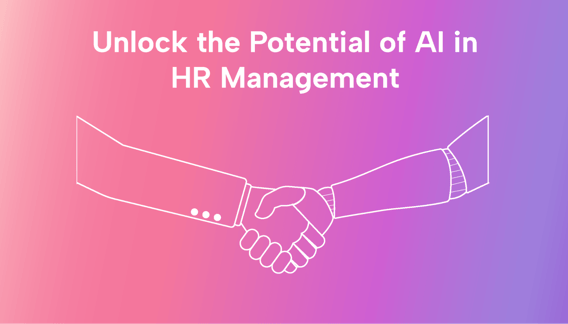Grappling with a mountain of human resources tasks, like the recruitment process, the onboarding process, career development, and employee experience.
It's demanding and can leave even the best HR professional stretched thin.
The sheer volume of work is daunting, not to mention the (costly) human error that seeps into repetitive tasks. Luckily, there’s an excellent solution here to help: artificial intelligence (AI).
AI systems can think, learn, and make decisions independently, but faster, and more accurately than we can. Machine learning (ML) is a significant component and benefit of AI. AI-powered tools can learn from vast amounts of data, help us make data-driven decisions, and automate routine tasks.
AI-powered tools have changed how HR managers and leaders manage their work. In this article, we’ll take a deep dive into the world of AI in HR and uncover its many benefits and uses.
How is AI being used in HR?
According to Eightfold's AI report, The Future of Work, many HR managers and leaders have already adopted AI into one of their work processes.
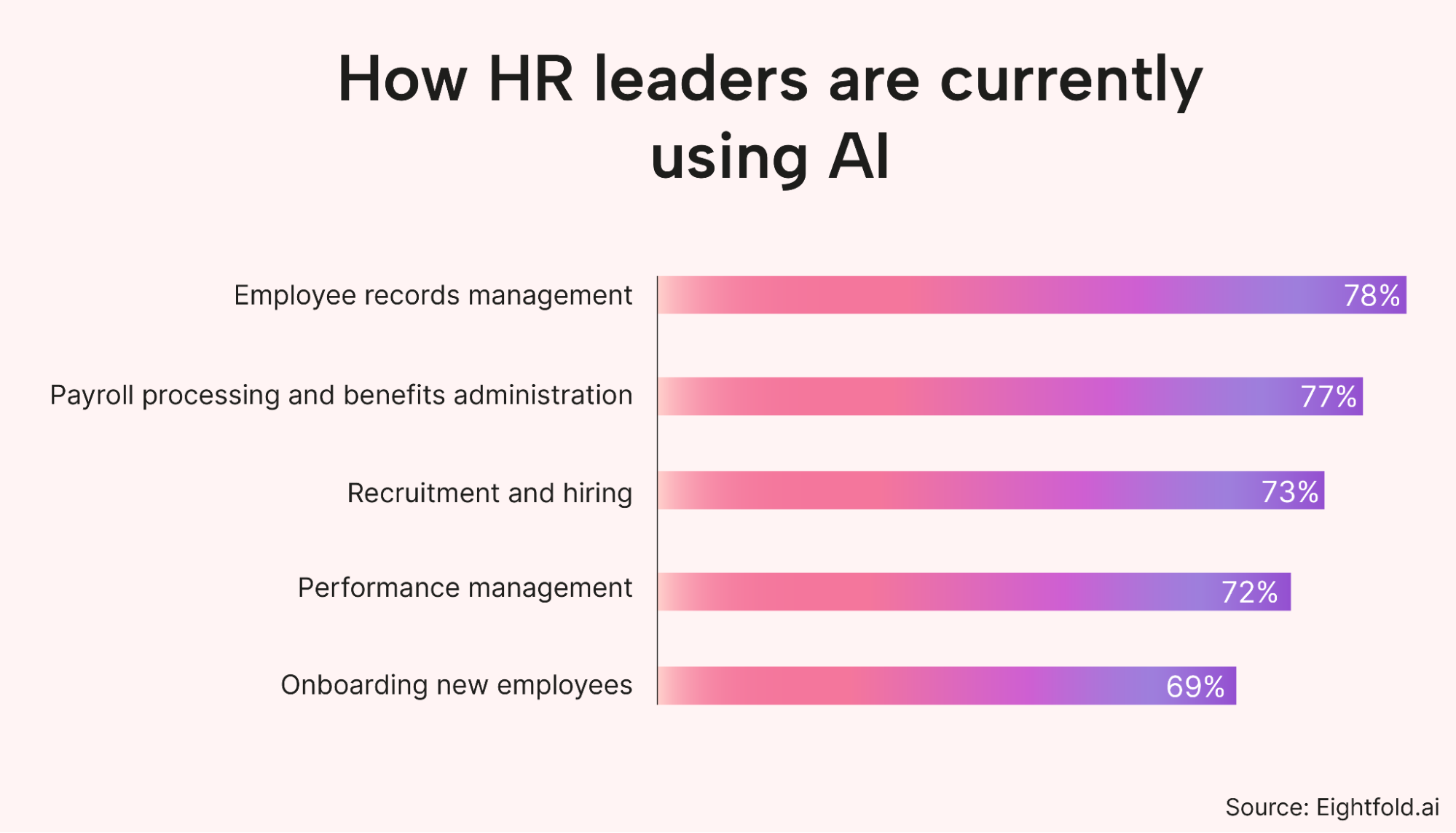
The key findings indicate that HR leaders use AI to manage employee records, payroll processing, recruitment and hiring, performance management, and onboarding.
A large majority (92%) of HR leaders also reported that they'll continue to adopt AI into as many processes as possible.
It's time to jump on the AI for HR wagon and ride it to the top before your competitors beat you there. Here's how:
1. Recruiting
Thanks to AI, you no longer have to sift through countless resumes to spot the ideal candidate for your job openings. AI systems can do that for you using Natural Language Processing (NLP). With NLP, it can look for specific keywords and skills in the job description, and if a resume matches the criteria, it'll flag it.
Let's say you are looking for a great designer to create custom images for your content. Your job ad might have the key "must have's" like five years of graphic design experience, Adobe skills, and agency knowledge. AI would flag resumes that include those skill sets.
AI removes (unfair) human bias within recruiting as it objectively assesses each candidate's profile. You'll get a clear picture of each candidate's strengths and weaknesses based on concrete information rather than (sometimes incorrect) gut feelings. The AI can also alert you if there are concerns with applicant documentation or skill gaps.
AI can also take over the time-consuming administrative tasks within recruiting. It can schedule interviews with candidates and send out job offers. A sound AI system, integrated with staffing company software, can sync with recruits' calendars to find the best meeting times. No more back-and-forth email chains where you try to lock in appropriate meeting dates or times. AI does it for you.
2. Onboarding
Employee onboarding, including the mountains of documents that must be checked, can be a painful (and slow) process. Often this can lead to other delays in the business or project as you wait for recruits to start.
AI systems make short work out of this, without error.
Let's say you just hired Sarah to be your designer. Using AI, you can instantly verify whether she has all the credentials listed in her application.
Adaptable AI-powered training modules can help onboarding by offering tailored content based on the individual's role and background. It can also help quickly identify and fill in any skill or knowledge gaps new employees might have.
Going back to Sarah, who needs to get up to speed on the new business processes. The AI system assesses Sarah's role, background, and specific training needs, then tailors the content accordingly. This will help her (and you) save valuable time and effort.
AI-powered chatbots can help guide new employees through work processes 24/7. They're ready to answer any questions Sarah may have and can give her accurate and instant responses. No more bugging you or the team as she gets up to speed.
3. Employee monitoring
AI systems are trained to recognize patterns and anomalies within data. This way, they can identify what makes up normal behavior (and what doesn't) to set a baseline.
With a baseline, the AI constantly compares current employee behavior to these norms. If an employee deviates significantly from their baseline, the AI flags it immediately so managers can act.
For example, if Sarah typically delivers on time but suddenly starts falling behind, Ai would catch that and raise a flag.
Some AI systems do predictive analytics, which analyzes data trends over time to predict potential issues, such as burnout or disengagement.
For instance, if Sarah's work patterns indicate increased stress, the AI can warn HR so they can step in and help.
4. Employee training and development
Training often uses a one-size-fits-all approach, focusing on generic skills instead of career paths. This is because it's challenging to tailor specific training programs for every role (and the required skill sets). Some might have strong skills in one area (like admin) but lack skills in another (like communication). This can leave career-based skill gaps.
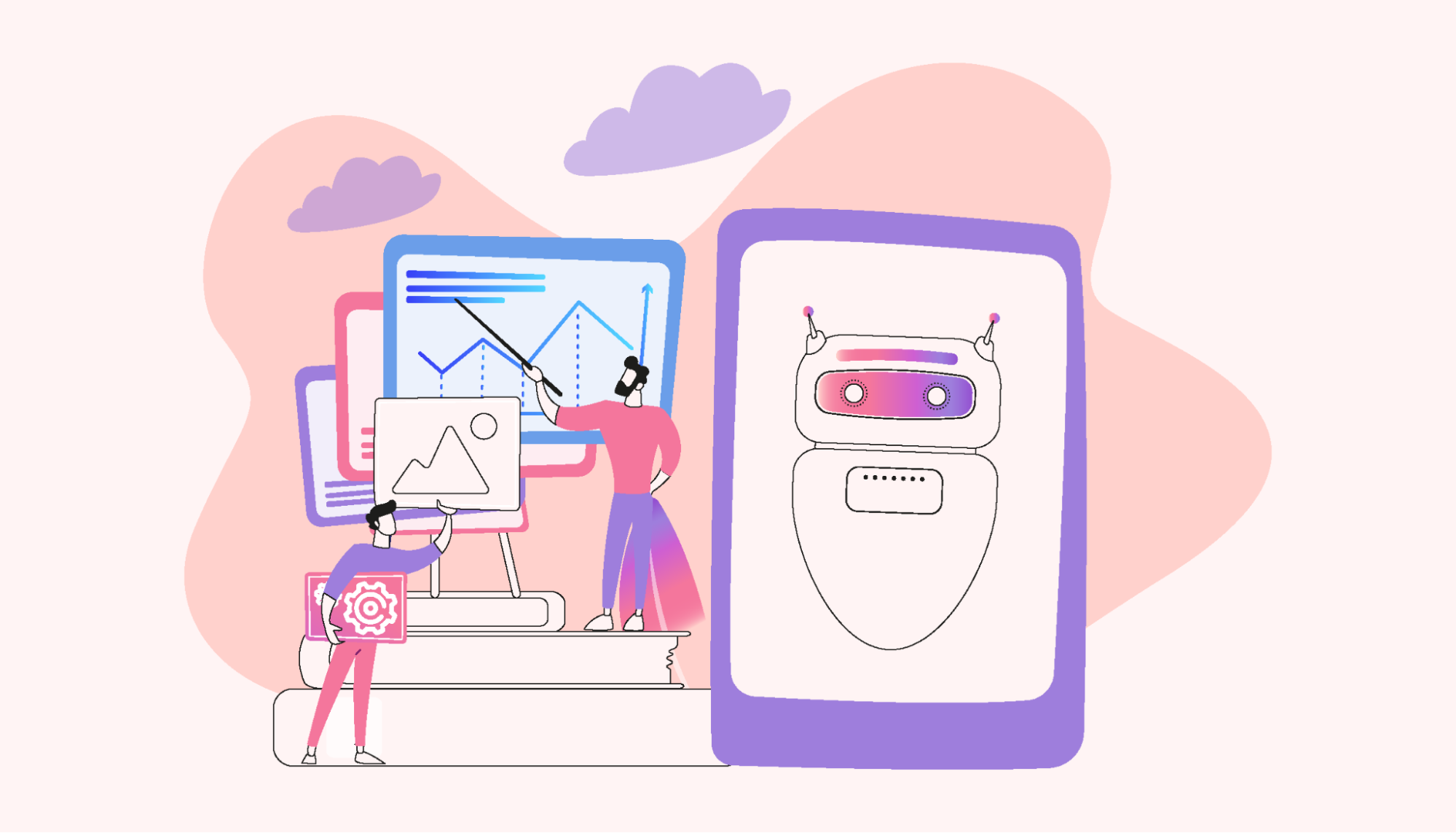
AI can help plan custom training courses and find employee skill gaps. It can also forecast future skill requirements based on industry trends and organizational growth.
Let's say a new tool enables designers to complete their designs in half the time. The AI would identify that Sarah would be much more productive if she learned how to use this tool. It can also create a custom training plan to help her learn the new skill.
AI systems can also help predict employee development and plan accordingly.
For example, say that you decide to create a (new) head of digital design role. Sarah has already proven herself as a top designer and has some managerial experience from her previous job. The AI would then recommend Sarah for the new role (and tailor training content for her).
What are the benefits of using AI in HR?
Now that you know what AI-powered tools can do for HR, let's look at some of the benefits of using these tools.
Lower overheads and more revenue
The bottom line, AI can drastically reduce the cost of the employee lifecycle, from recruitment to employee retention.
AI's personalized training recommendations can minimize unnecessary training expenses.
Some AI systems can track employee performance and let you know if an employee is overworked. Keeping existing talent is more cost-effective than recruiting and training new employees.
And with AI's predictive capabilities, HR can anticipate talent needs more accurately. This leads to better workforce planning.
It's not just about lower costs. McKinsey's Global AI Survey highlights that 23% of HR respondents reported an average revenue increase of 6%—10% because of AI adoption.
Leaner operations
AI excels at automating routine administrative tasks. Besides the tasks already covered, it can automate:
- Payroll
- Tracking employee attendance
- Sending project updates to other employees
- Resource allocation
Some AI systems (like Motion) can even plan employee work schedules.
Better decision-making
AI helps to cross out a lot of bias and guesswork out of work.
For example, the AI can objectively help you pinpoint possible promotions and raises in the annual work review process.
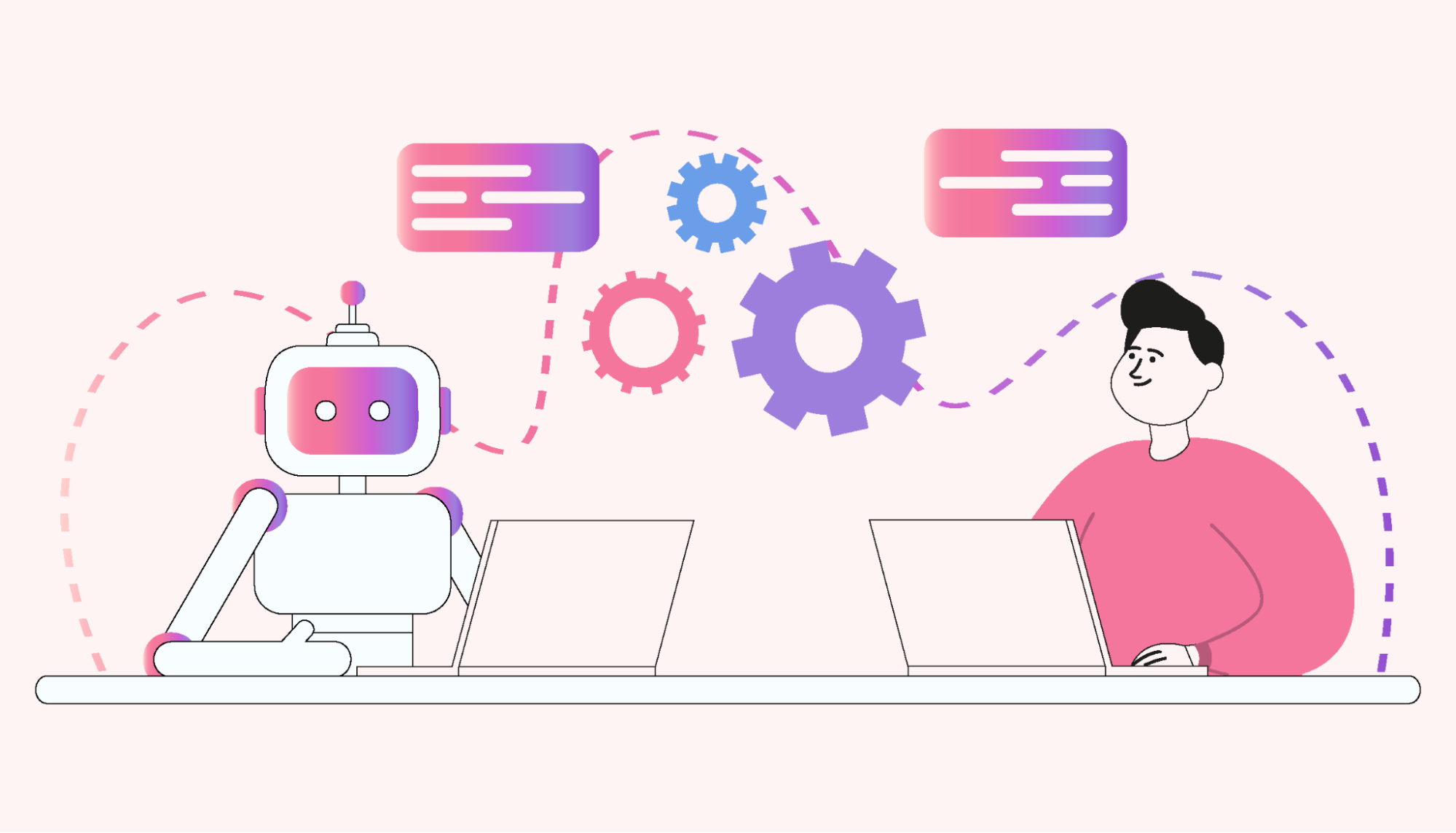
AI can also help craft competitive benefit plans. It can recommend benefit packages that align with market trends, business growth, and employee contributions.
AI is limited in ability
While the abilities of AI are fantastic, it has its limitations
A Harvard Business School survey revealed a significant challenge in the AI-driven hiring process. In the survey, 88 percent of HR execs reported that their AI systems rejected qualified candidates. This is due to the complexity of job descriptions, which often include a long list of qualifications.
AI systems may also struggle with resumes that show work gaps of more than six months. These gaps are primarily due to legitimate life events such as military deployment, pregnancy, or illness. AI, on its own, doesn't have the contextual knowledge to evaluate such situations accurately.
It's best to do your due diligence on the AI system you want to use. Opting for an all-in-one AI HR software that claims to do everything might be tempting but also a fool's errand. They just don't exist (yet.) You'll also want to suss out true AI. Some tools claim to be AI-powered but are just repackaging existing functionality.
Motion can help with your employee tracking and scheduling
Motion is an AI project management platform with many features that can help you with your HR tasks and management.
Motion's AI can automatically schedule tasks for your entire business. You create the project, list the sub-tasks, and assign the deadlines and priorities, and Motion does the rest. It finds the best time for each task, along with the right team member, and books it into their schedule.
Motion can also (cleverly) reorganize schedules if priorities change or problems arise.
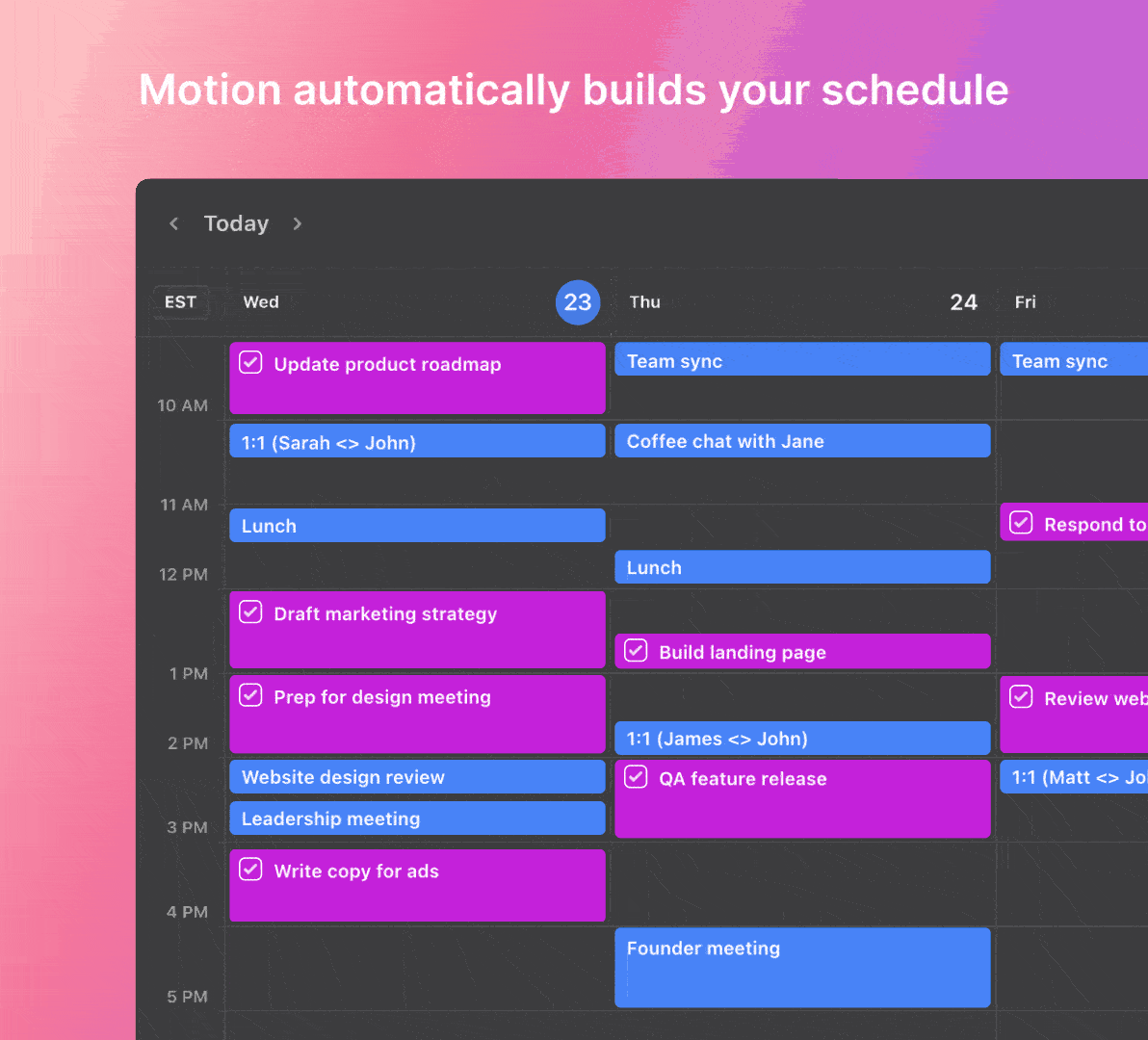
Motion can help you with reporting as well. It can give you real-time insights into project status, task completion rates, individual contributions, and current capacity.
Sign up for your 7-day free trial.
